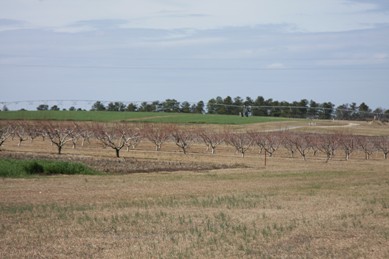By Clint Thompson
Weed control in peach orchards is an important management tactic. This is important for young and older orchards, says Wayne Mitchem, N.C. State Extension Associate and Southern Region Small Fruit Consortium Coordinator.

Photo Credit ~ N.C. State
“The idea is to try to minimize competition so we can maximize that tree growth in those formative years of the orchard so we can bring that orchard into production as quickly as possible. Weed control is extremely critical in newly planted and non-bearing situations,” Mitchem said.
“We’ve (also) done some work over the years that have shown that in order to maximize fruit size and in order to maximize yields, we pretty much have to keep that orchard weed free and weeds not competing with that tree to within at least two weeks of harvest in order to maximize yields and fruit size.”
Weed management is especially vital since weed control could also lead to insect control.

“It’s pretty well documented that winter annual broadleaf weeds provide a natural habitat for these insect pests to overwinter. Some work was done a number of years ago, I know in New Jersey at Rutgers, where they looked at the impact of herbicides used to eliminate those winter annual broadleaf weeds and the impact it had on insect pest pressure. It was pretty dramatic controlling those weeds what kind of impact it could have on managing insect pests,” Mitchem said.
Some of the winter annual weeds that growers need to be mindful of include cutleaf primrose, Carolina geranium and horseweed. Mitchem recommends growers apply herbicides before bloom to treat row middles.
“It’s part of an integrated approach towards managing the insect pests by eliminating the winter annual broadleaf weeds in the row middles,” Mitchem said.
The peach orchard at the Sandhills Research Station includes a collection of peach varieties bred in North Carolina.
Read more at: https://peaches.ces.ncsu.edu/peachesproduction-and-management/









